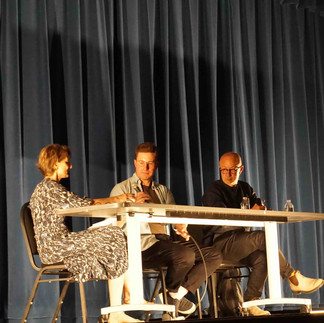An Afternoon of Reflection & Conversation — Grynberg & Bye in the Twin Cities
- MPMS MN Polish Medical Society

- Oct 27, 2025
- 2 min read
Updated: Nov 23, 2025
On October 5, 2025, around 50 people gathered for an intimate afternoon event hosted by the Minnesota Polish Medical Society in collaboration with the Jewish Community Center of the Minneapolis-St. Paul Region, the Polish Cultural Institute New York, POLIN-the Museum of the History of Polish Jews, and the Book Institute of Poland. The agenda: a screening of the film Proof of Identity, followed by a literary conversation with acclaimed Polish author, Mikolaj Grynberg, moderated by Katarzyna Leville and featuring translator Sean Gasper Bye.
Film + Discussion
The screening of Proof of Identity, courtesy of POLIN, set the tone: thoughtful, haunting, and inviting deep reflection on themes of identity, memory, and the shifting landscapes of Polish-Jewish life. After the film, Grynberg and Bye joined the audience for a lively discussion. Topics ranged from the broader questions of memory, trauma, and belonging in post-war and contemporary Poland. Attendees noted that Grynberg’s presence made the abstract feel more personal.
Book Signing & Community Moments
After the conversation, there was a book signing, accompanied by refreshments courtesy of the JCC. Many participants connected over Polish and Jewish cultural overlaps, networking, and ideas for future collaborations — a living example of the event’s mission: building community across culture, history, and profession.
Why It Matters
Grynberg is known for works such as I’d Like to Say Sorry, But There’s No One to Say Sorry To and Confidential, which blend documentary, fiction, and oral history to explore Jewish life in Poland. His visit to the Twin Cities was more than an author-event: it was a moment of cultural bridging — Polish heritage meeting Jewish memory, literature meeting film, and local community meeting global conversation.
And yes — by gathering under the banner of such thoughtful exploration, this event reminded us: our histories matter, our identities shift, and our communities thrive when we engage honestly and openly.






























Comments